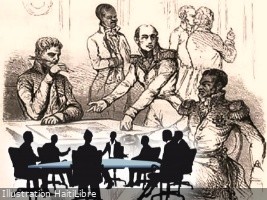The Haitian National Committee for Restitution and Reparations (CNHRR) has unveiled an ambitious 2026 Roadmap aimed at addressing the historical and moral debt owed by France for the ‘double ransom’ imposed on Haiti in the 19th century. This initiative seeks to transform the struggle for justice into a comprehensive societal project involving education, research, diplomacy, and public mobilization.
Historical Context:
In 1825, France demanded Haiti pay 150 million gold francs (later reduced to 90 million) as compensation for the loss of its colony and colonists’ properties. This sum, borrowed at exorbitant rates, crippled Haiti’s economic and social development for over a century, earning the term ‘double ransom.’
CNHRR’s Formation and Mission:
Established on August 8, 2025, the CNHRR comprises representatives from Haiti’s Presidency, Prime Minister’s Office, Ministry of Economy and Finance, Ministry of Foreign Affairs, civil society, and academic experts. Its mandate is to advocate for restitution and reparations from France and the international community.
2026 Roadmap Highlights:
1. **Action Plan and Structures**: The CNHRR has finalized its annual action plan and established working subgroups to address various aspects of restitution and reparations.
2. **Educational Reforms**: Collaboration with the Ministry of Education to revise history curricula and textbooks, ensuring the ‘double ransom’ is accurately represented.
3. **Public Awareness**: Nationwide conferences, webinars, and a national survey to gather public opinion on restitution.
4. **Academic Research**: Scholarships for Haitian students to conduct master’s and doctoral research on the topic.
5. **Scientific Conferences**: Two major conferences planned for 2026 on slavery, reparations, and public health.
6. **White Paper Publication**: A comprehensive document outlining arguments for restitution will be published and made accessible to all Haitians.
7. **Financial Calculations**: Collaboration with experts to determine actuarial and discounted amounts for negotiations.
8. **Student Engagement**: Study days and literary competitions to foster awareness among Haitian youth.
9. **Research Chair**: Establishment of a Research Chair at the State University of Haiti to host academic conferences and lectures.
10. **Social Mobilization**: A communication plan to involve civil society and grassroots organizations in the restitution process.
11. **International Collaboration**: Strengthening ties with CARICOM, African, American, and European organizations to build a united front for restitution.
This roadmap represents a significant step in Haiti’s quest for historical justice, aiming to rectify centuries of economic and social injustice inflicted by colonial exploitation.
